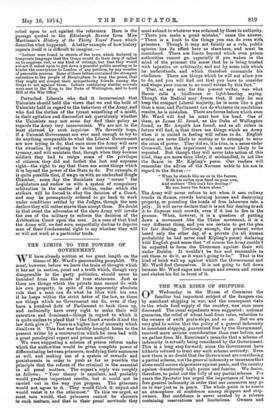THE LIMITS TO THE POWERS OF GOVERNMENT.
WE have already written at too great length on the theme of Mr. Ward's gasconading pamphlet. We must, however, before we leave the train of thought which it has set in motion, point out a truth which, though very disagreeable to the party politician, should never be banished from the minds of true statesmen. Just as there are things which the private man cannot do with his own property, in spite of the apparently absolute rule that a man can do what he likes with his own if he keeps within the strict letter of the law, so there are things which no Government can do, even if they have a hundred Acts of Parliament to back them up, and technically have every right to make their will executive and dominant—things in regard to which it is quite useless to plead that " the Court awards it and the law doth give it." There is a higher law of necessity which disallows it. This fact was forcibly brought home to the present writer by a conversation which he once had with a great penological expert and prison authority. We were suggesting a scheme of prison reform under which the authorities would be given complete power of differentiating between prisoners, modifying their sentences at will, and making use of a system of rewards and punishments in order to push as far as possible the principle that the reform of the criminal is the essential in all penal matters. The expert's reply was roughly as follows : " Your theory is excellent, and probably would produce important results, but it could not be carried out in the way you propose. The prisoners would not agree to.it. They would think it unjust and would resist it, to the uttermost." To this we urged, as most men would, that prisoners cannot be choosers in such matters, and that in their penal servitude they must submit to whatever was ordained by those in authority. " There you make a great mistake," came the answer. "There is a limit to the things you can do even with prisoners. Though it may act faintly as a rule, public opinion has its effect here as elsewhere, and must be considered. There are limits beyond which even prison authorities cannot go, especially if you waken in the mind of the prisoner the sense that he is being treated with injustice or arbitrarily, and not by some rule which he understands, and which therefore commands his obedience. There are things which be will not allow you to do, and you will find out that you have to consider and shape your course to no small extent by this fact." That, at any rate for the present writer, was what Bacon calls a luciferous or light-bearing saying. Though the Radical may dream that, if only he can keep the compact Liberal majority, he is more like a god than a man, and Parliament can do whatever its resolutions resolve, he is mistaken. There are forces before which even Mr. Ward will find he must bow his bead. One of them, as James II. found, as the Duke of Wellington found, as Mr. Asquith has found, and as all rulers in future will find, is that there are things which an Army when it is united in feeling will refuse to do. English armies are never likely to mutiny or to attempt to seize the reins of power. They did so, it is true, in a sense under Cromwell, but the experiment is one never likely to be repeated. But though they will never take action of this kind, they are more than likely, if mishandled, to act like the Saxon in Mr. Kipling's poem. Our readers will remember the advice of the Norman noble to his son in regard to the Saxon :- " When he stands like an ox in the furrow,
With his sullen eyes fixed on your own, And mutters 'This isn't fair dealing !'
My son, leave the Saxon alone."
The Army will never refuse to act when it sees railway trucks in flames, crowds burning houses and destroying property, or pounding the heads of free labourers into a jelly. It will never declare that it is not fair dealing to ask it to disperse such crowds, even if it has to fire in the process. When, however, it is a question of putting down a movement like the Ulster movement, it is a very different thing, and you are certain to get the plea for fair dealing. Curiously enough, the present writer heard only the other day of a private (in all human probability be had never read Kipling's poem) declaring with English good sense that " of course the Army couldn't be expected to force the Ulstermen against their will under Dublin. It wouldn't be fair and reasonable to ask them to do it, so it wasn't going to be." That is the kind of brick wall up against which the Government and Mr. Ward find themselves. It is not going to fall down because Mr. Ward rages and ramps and swears and curses and shakes his fist in front of it.










































 Previous page
Previous page